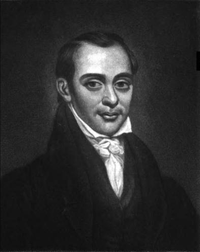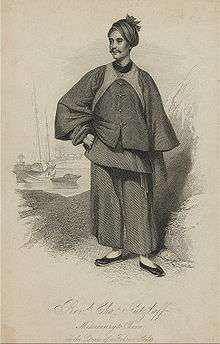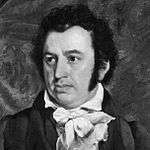Karl Gützlaff
| Karl Gutzlaff | |
|---|---|
 | |
| Born |
8 July 1803 Pyritz, Pomerania, Prussia |
| Died |
9 August 1851 (aged 48) British Hong Kong |
| Resting place | Hong Kong Cemetery |
| Occupation | Missionary, translator |
| Title | Reverend |
| Religion | Lutheran |
Karl Friedrich August Gützlaff[1] (8 July 1803 – 9 August 1851), anglicised as Charles Gutzlaff, was a German missionary to the Far East, notable as one of the first Protestant missionaries in Bangkok, Thailand (1828) and in Korea (1832). He wrote widely read books, such as Journal of Three Voyages along the Coast of China in 1831, 1832 and 1833, with notices of Siam, Corea, and the Loo-Choo Islands (1834). He served as interpreter for British diplomatic missions during the First Opium War. Gutzlaff was one of the first Protestant missionaries in China to wear Chinese clothing. Gutzlaff Street in Hong Kong was named after him.
Life
Born at Pyritz (present-day Pyrzyce), Pomerania, he was apprenticed to a saddler in Stettin, but was able to secure admission to Pädagogium in Halle, and associated himself with the Janike Institute in Berlin.
The Netherlands Missionary Society sent him to Java in 1826, where he learned Chinese. Gutzlaff left the society in 1828, and went first to Singapore, then to Bangkok with Jacob Tomlin of the London Missionary Society, where he worked on a translation of the Bible into Thai. He made a brief trip to Singapore in December 1829, where he married a single English missionary Maria Newell. The two returned to Bangkok in February 1830 where they worked on a dictionary of Cambodian and Lao. Before the work was completed, however, Maria died in childbirth, leaving a considerable inheritance. Gutzlaff married again, this time to Mary Wanstall, in 1834. The second Mrs. Gutzlaff ran a school and a home for the blind in Macau. She died in 1849 in Singapore, and was buried there. Gutzlaff's third marriage was to Dorothy Gabriel in England in 1850.

In Macau, and later in Hong Kong, Gutzlaff worked on a Chinese translation of the Bible, published a Chinese-language magazine, Eastern Western Monthly Magazine, and wrote Chinese-language books on practical subjects. In 1834 he published Journal of Three Voyages along the Coast of China in 1831, 1832 and 1833. Along the way he handed out tracts which had been prepared by another pioneer missionary to China, Robert Morrison. In late 1833, he acted as naturalist George Bennett's Cantonese interpreter on his visit to Canton.[2]
In 1840, a group of four people (Walter Henry Medhurst, Charles Gutzlaff, Elijah Coleman Bridgman, and John Robert Morrison) cooperated to translate the Bible into Chinese. The translation of the Hebrew part was done mostly by Gutzlaff, with the exception that the Pentateuch and the book of Joshua were done by the group collectively. This translation, completed in 1847, is well-known due to its adoption by the revolutionary peasant leader Hong Xiuquan of the Taipingtianguo movement (Taiping Rebellion) as some of the reputed early doctrines of the organization. This Bible translation was a version (in High Wen-li, Traditional Chinese: 深文理) correct and faithful to the original.
In the 1830s Gutzlaff was persuaded by William Jardine of Jardine, Matheson & Co. to interpret for their ships' captains during coastal smuggling of opium, with the assurance that this would allow him to gather more converts. Gutzlaff later assisted in negotiations during the First Opium War of 1839–42. In response to the Chinese government's unwillingness to allow foreigners into the interior, he founded a school for "native missionaries" in 1844 and trained nearly fifty Chinese during its first four years. Unfortunately, Gutzlaff's ideas outran his administrative ability. He wound up being victimized by his own native missionaries. They reported back to him glowing accounts of conversions and New Testaments sold. While some of Gutzlaff's native missionaries were genuine converts, others were opium addicts who never traveled to the places they claimed. Eager for easy money, they simply made up conversion reports and took the New Testaments which Gutzlaff provided and sold them back to the printer who resold them to Gutzlaff.
The scandal erupted while Gutzlaff was in Europe on a fundraising tour.[3] Shattered by the exposure of this fraud, Gutzlaff died in Hong Kong in 1851. The Chinese Evangelization Society which he formed lived on, however, to send out Hudson Taylor who founded the successful China Inland Mission. Taylor called Gutzlaff the grandfather of the China Inland Mission.
Society for the Diffusion of Useful Knowledge in China
On 29 November 1834, Gutzlaff became a member of the newly formed "Society for the Diffusion of Useful Knowledge in China". The committee members represented a wide section of the business and missionary community in Canton: James Matheson (Chairman), David Olyphant, William Wetmore, James Innes, Thomas Fox, Elijah Coleman Bridgman, and John Robert Morrison. John Francis Davis, at that time chief superintendent of British trade in China, was made an honorary member.[4]
Influences
Gutzlaff's writing influenced both Dr. Livingstone and Karl Marx. David Livingstone read Gutzlaff's "Appeal to the Churches of Britain and America on Behalf of China" and decided to become a medical missionary. [5] Unfortunately, it was 1840, and the outbreak of the First Opium War made China too dangerous for foreigners. So the London Missionary Society sent him to Africa, where (in 1871) Henry Morton Stanley would find him working hard in Ujiji, Tanzania.[6]
While Gutzlaff was fundraising in Europe in 1850, Karl Marx went to hear him speak in London. He also read Gutzlaff's many writings, which became sources for Karl Marx' articles on China for the London Times and the New York Daily Tribune in the 1840s and 1850s, all of which are anti-imperialist and anti-religion.[7][8]
Works
- A Sketch of Chinese History, Ancient and Modern (London, 1834, German version in 1847), Volume One, Volume Two
- Karl Friedrich A. Gützlaff (1838). China Opened; or, A Display of the Topography, History ... etc. of the Chinese Empire, revised by A. Reed. Volume One
- China Opened; Or, A Display of the Topography, History, Customs, Manners, Arts, Manufactures, Commerce, Literature, Religion, Jurisprudence, etc. of the Chinese Empire. London: Smith, Elder & Co. 1838. Volume Two
- Karl Friedrich A. Gützlaff (1840). Journal of Three Voyages Along the Coast of China, in 1831, 1832 and 1833 With Notices of Siam, Corea, and the Loo-Choo Islands.
- Gützlaff, Karl F A (1842). Notices on Chinese Grammar: Part I. Orthography and Etymology. Batavia., under pseudonym "Philo-Sinensis"
- Life of Taou-Kwang, Late Emperor of China. London: Smith, Elder & Co. 1852.
References
- ↑ He gave himself the Chinese name, 郭士立 (Sidney Lau: gwok3 si6 laap6), but later on 郭實腊 (Sidney Lau: gwok3 sat6 laap6) became his official Chinese name.
- ↑ Bennett, George (1834). Wanderings in New South Wales, Batavia, Pedir Coast, Singapore and China: being the journal of a naturalist in those countries, during 1832, 1833 and 1834 (Vol. 2). London: Richard Bentley. p. 28.
- ↑ Riazanov, David (1926). "Karl Marx in China". Marxists Internet Archive. Marxists Internet Archive. Retrieved December 9, 2015.
- ↑ Elijah Coleman Bridgman; Samuel Wells Williams (1835). The Chinese Repository. Maruzen Kabushiki Kaisha. p. 381.
- ↑ Roberts, A D (2004). "Livingstone, David (1813–1873)". Oxford Dictionary of National Biography. Oxford: Oxford University Press.
- ↑ Lutz, Jessie G.; Lutz, R. Ray (March 1, 1999) [1996]. "Karl Gützlaff's Approach to Indigenization: the Chinese Union". Christianity in China From the Eighteenth Century to the Present. Stanford University Press. ISBN 978-0-8047-3651-0.
- ↑ Torr, Dona (1951). Marx on China, 1853-1860. London: Lawrence & Wishart. p. xvii. ASIN B000L9BJRS.
- ↑ Fisher, Eve (December 3, 2015). "The Drug Smuggling Missionary of the Pearl River". sleuthsayers.org.
Bibliography
- Lutz, Jessie Gregory. Opening China: Karl F.A. Gützlaff and Sino-Western Relations, 1827-1852. Grand Rapids, Mich.: William B. Eerdmans Pub. Co., 2008. ISBN 080283180X.
- Herman Schlyter, Der China-Missionar Karl Gützlaff und seine Heimatbasis: Studien über das Interesse des Abendlandes an der Mission des China-Pioniers Karl Gützlaff und über seinen Einsatz als Missionserwecker (Lund: LiberLäromedel/Gleerup, 1976) ISBN 91-40-04373-8
- Winfried Scharlau (ed.), "Gützlaffs Bericht über drei Reisen in den Seeprovinzen Chinas 1831-1833" (Hamburg: Abera Verlag, 1997) ISBN 3-934376-13-4
- Thoralf Klein/Reinhard Zöllner (eds.), "Karl Gützlaff (1803-1851) und das Christentum in Ostasien: Ein Missionar zwischen den Kulturen" (Nettetal: Institut Monumenta Serica, Sankt Augustin/Steyler Verlag, 2005) ISBN 3-8050-0520-2
- Waley, Arthur (1968). The Opium War Through Chinese Eyes. Stanford University Press. ISBN 978-0-8047-0611-7.
Further reading
- Endacott, G. B. (2005) [1962]. A biographical sketch-book of early Hong Kong. Hong Kong University Press. ISBN 978-962-209-742-1.
External links
| Wikimedia Commons has media related to Karl Gützlaff. |
| Wikisource has the text of the 1905 New International Encyclopedia article Gützlaff, Karl F. A.. |
- Scanned version of the <Journal of Three Voyages> at Singapore
- University of Hong Kong library page about book and Gutzlaff
- "Gutzlaff, Karl Friedrich August," Biographical Dictionary of Chinese Christianity
- Karl Friederick August Gützlaff (1803-1851) Find a Grave Memorail
